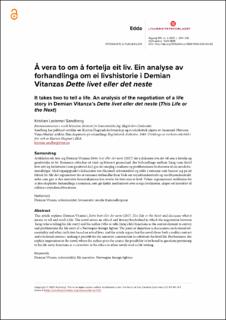| dc.contributor.author | Sandberg, Kristian Lødemel | |
| dc.date.accessioned | 2021-09-16T13:59:08Z | |
| dc.date.available | 2021-09-16T13:59:08Z | |
| dc.date.created | 2021-09-09T14:47:01Z | |
| dc.date.issued | 2021 | |
| dc.identifier.citation | Edda. Nordisk tidsskrift for litteraturforskning. 2021, 108 (3), 204-216. | en_US |
| dc.identifier.issn | 0013-0818 | |
| dc.identifier.uri | https://hdl.handle.net/11250/2778679 | |
| dc.description | Copyright © 2021 Author(s). This is an open access article distributed under the terms of the Creative Commons CC-BY-NC 4.0
License (https://creativecommons.org/licenses/by-nc/4.0/). | en_US |
| dc.description.abstract | Artikkelen tek føre seg Demian Vitanzas Dette livet eller det neste (2017) for å diskutere kva det vil seia å fortelja og gjenfortelja eit liv. Romanen utforskar eit etisk og litterært grenseland, der forhandlinga mellom Tariq (som fortel livet sitt) og forfattaren (som gjenfortel det) gjer det mogleg å realisere og problematisere livshistoria til ein norsk framandkrigar. Med utgangspunkt i diskusjonar om fiksjonell referensialitet og etikk i romanar som baserer seg på eit faktisk liv, blir det argumentert for at romanen forhandlar fram både ein røyndomskontrakt og ein fiksjonskontrakt, noko som gjer at den narrative konstruksjonen kan overta for livet som er levd. Vidare argumenterer artikkelen for at den eksplisitte forhandlinga i romanen, som gir kjelda medråderett over si eiga livshistorie, skaper eit korrektiv til etikken i røyndomslitteraturen. | en_US |
| dc.description.abstract | Abstract: This article explores Demian Vitanza’s Dette livet eller det neste (2017; This Life or the Next) and discusses what it means to tell and retell a life. The novel enters an ethical and literary borderland in which the negotiation between Tariq (who is telling his life story) and the author (who re-tells Tariq’s life) functions as the central element to convey and problematize the life story of a Norwegian foreign fighter. The point of departure is discussions on fictional referentiality and ethics in fiction based on actual lives, and the article argues that the novel closes both a reality contract and a fictional contract, making it possible for the narrative construction to substitute the lived life. Furthermore, the explicit negotiation in the novel, where the author gives the source the possibility to be heard in questions pertaining to his life story, functions as a corrective to the ethics in other novels read as life writing. | en_US |
| dc.language.iso | nno | en_US |
| dc.rights | Navngivelse-Ikkekommersiell 4.0 Internasjonal | * |
| dc.rights.uri | http://creativecommons.org/licenses/by-nc/4.0/deed.no | * |
| dc.subject | Demian Vitanza | en_US |
| dc.subject | referensialitet | en_US |
| dc.subject | livsnarrativ | en_US |
| dc.subject | norske framandkrigarar | en_US |
| dc.subject | referentiality | en_US |
| dc.subject | life narrative | en_US |
| dc.subject | Norwegian foreign fighters | en_US |
| dc.title | Å vera to om å fortelja eit liv. Ein analyse av forhandlinga om ei livshistorie i Demian Vitanzas Dette livet eller det neste | en_US |
| dc.title.alternative | It takes two to tell a life. An analysis of the negotiation of a life story in Demian Vitanza’s Dette livet eller det neste (This Life or the Next) | en_US |
| dc.type | Peer reviewed | en_US |
| dc.type | Journal article | en_US |
| dc.description.version | publishedVersion | en_US |
| dc.subject.nsi | VDP::Humaniora: 000::Litteraturvitenskapelige fag: 040 | en_US |
| dc.source.pagenumber | 204-216 | en_US |
| dc.source.volume | 108 | en_US |
| dc.source.journal | Edda. Nordisk tidsskrift for litteraturforskning | en_US |
| dc.source.issue | 3 | en_US |
| dc.identifier.doi | https://doi.org/10.18261/issn.1500-1989-2021-03-05 | |
| dc.identifier.cristin | 1932889 | |
| cristin.ispublished | true | |
| cristin.fulltext | original | |
| cristin.qualitycode | 2 | |

